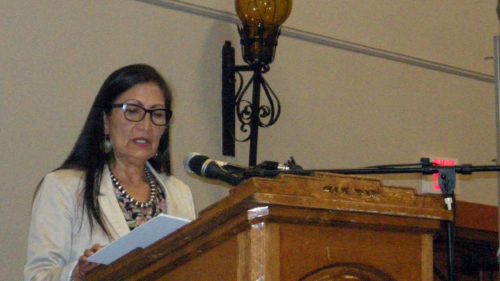Two members of New Mexico’s congressional delegation have signed on as original sponsors of a bill introduced Friday that would provide support for some 12,000 plant and wildlife species.
Rep. Ben Ray Lujan, D-NM, and Rep. Deb Haaland, D-NM and vice-chair of the House Natural Resources Committee, are among the sponsors of the Recovering America’s Wildlife Act. The act was introduced Friday by Rep. Jeff Fortenberry (R-NE) and Debbie Dingell (D-MI). Altogether, the sponsors were 40 Democrats and 20 Republicans.
The bill would do the following:
_ provide $1.4 billion annually for conservation efforts directed at the more than 12,000 species.
_ fund recovery efforts in every state and territory.
_ help the recovery of 1,600 species already listed as threatened or endangered under the Endangered Species Act.
_ require development of state-specific action plans.
_ provide nearly $100 million a year to Indian tribes for wildlife conservation on roughly 140 million acres.
Collin O’Mara, president and CEO of the National Wildlife Federation, on Friday welcomed the introduction of the bill.
“More than one-third of all wildlife species in the United States are at-risk or vulnerable to extinction,” O’Mara said Friday. “If we are serious about saving our wildlife heritage, we must invest in on-the-ground solutions that match the magnitude of the crisis.”
John Crenshaw, president of the New Mexico Wildlife Federation board and Jesse Deubel, the group’s executive director, wrote to members of the state’s congressional delegation this week urging their support.
“This legislation would rank with the farsighted Pittman-Robertson Act of 1937 and Dingell-Johnson Act of 1950,” Crenshaw and Deubel wrote. “Those two pieces of legislation have funded, respectively, the incredibly effective restoration and research programs for game animals such as deer, elk and turkey, and sport fish such as trout, bass and salmon.
“The Recovering America’s Wildlife Act, patterned after those great programs, brings the same foresight and federal-state cooperation to bear for an even broader array of wildlife that is not hunted or fished for – some 12,000 species nationwide that are in need of proactive, voluntary conservation,” Crenshaw and Deubel wrote.
For New Mexico specifically, enacting the new program would bring the state an estimated $27 million in new federal revenue, enough to bring nongame and endangered species conservation and management up to par with the New Mexico Department of Game and Fish’s proven management of game animals and sport fish, Crenshaw and Deubel wrote.
“We’re thrilled with Lujan’s and Haaland’s support and look forward to working with the entire delegation to see this program enacted into law,” Deubel said Friday. “Conserving all wildlife is critical to the future of our state and our nation.”



